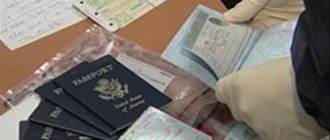Grounds for conducting a personal search
Before operating with this concept, it is necessary to find out what the legislation means by it. Its foundations are revealed in Art. 27.7 of the Code of Administrative Offenses of the Russian Federation, in accordance with it, this is an inspection of things on a person and with him. This is hand luggage (bags, briefcases, packages), luggage, hunting and fishing items, etc.
The citizen's consent is not required to carry out the procedure.
Personal search is an administrative procedural measure. The basis for its conduct is the commission of administrative offenses, information about the citizen’s possession of weapons, explosives, psychotropic and narcotic drugs.
Information must be obtained from reliable sources. They can be statements from individuals and legal entities, government bodies, police orientations.
Hand luggage inspection procedure.
A protocol must be kept in the presence of two witnesses or using video recording. If there is information that the person subjected to a personal search may have a weapon or show resistance, witnesses are not needed. They may also not be present if video surveillance or video recording is being carried out.
During this procedure, an examination of the body, clothing, and items in the citizen’s possession are examined. The integrity of things is not compromised. The citizen is examined, not searched. Everything discovered during the inspection is entered into the protocol. This should not just be a list, but a description of each item, indicating identification characteristics. If the violator is a minor or incompetent, then all actions are performed in the presence of legal representatives.
Basic rule during a search
Impeccable compliance with the following rule will allow you to avoid major problems after the criminal case goes to court - do not take any items from operatives or the investigator!
Having noticed that a member of the search team takes something out of a closet (under the bed, from a nightstand, etc.) that is not yours, you must immediately declare that the thing is not yours and you do not know what it is or who the owner is and by whom it was placed in your closet. Do not approach this thing, do not look at it or pick it up with your hands!
It is extremely important for the suspect (and it is he who will be offered to look at the little thing in such a situation) to ignore the polite approach of the operative with his hands protected by gloves, holding out a certain object with a request to look carefully. If the suspect nevertheless takes the thing handed to him, it will be very difficult to prove his non-involvement in it.
Who has the right to conduct searches of citizens?
In Art. 27.2, 27.3 of the Code of Administrative Offenses provides a list of government bodies whose responsibilities include monitoring the implementation of legislation in various areas.
The following officials have the right to conduct inspections and draw up protocols:
- Police - upon detection of offenses provided for in paragraph 1, part 2, art. 28.3 of the Code of Administrative Offenses independently or when officials contact them, Art. 27.2, 27.3 Code of Administrative Offences.
- The National Guard, as well as departmental and non-departmental security subordinate to it.
- Bodies exercising control or supervision over the implementation of rules for the use of transport.
- Military traffic police - in case of violation of traffic rules by military drivers in transport of the Russian Armed Forces, the National Guard, civil defense troops, engineering, technical and road construction units.
- Bodies monitoring compliance with legislation on environmental protection, forestry, livestock farming, fisheries, and water resources.
- Border troops, bodies of the Ministry of Internal Affairs, military personnel and other persons entrusted with the responsibilities of protecting the state border.
- Border Troops - when identifying administrative offenses in internal sea waters.
- Customs authorities - in case of violation of Customs rules.
- Drug control authorities.
- Carrying out counter-terrorism operations and revealing violations of the law under Art. 20.27 Code of Administrative Offences.
- Bailiffs who ensure the established order in the courts.
- Migration authorities.
Procedure for carrying out the procedure by police officers
A personal search is carried out by officials authorized to perform this action and who have the right to draw up a protocol.
Mandatory conditions for production are the following:
- The searched citizen must be explained the reason (basis) for this procedure.
- Invite him to provide for examination documents, things and objects with which administrative offenses were committed.
- The search of a citizen is carried out by a police officer of the same gender as him.
- Two witnesses are invited. Their role can be played by people who must meet the following requirements: be over 18 years of age, have no interest in the case, sober, sane, not part of the squad, not familiar with the police, of the same sex as the suspect.
- The inspection procedure must be carried out in premises that meet sanitary requirements and exclude access by unauthorized persons.
- The person being searched is ensured: safety, health, dignity, confidentiality of personal life is guaranteed, except for cases provided for by law.
- When performing an inspection, if there is information about the presence of explosives or weapons, the procedure is carried out in the absence of witnesses. When filming video, the presence of the latter may also not be necessary.
- A protocol is drawn up in which all information received is entered.
- Discovered items to which all established methods of recording material evidence have been applied (description, measurement, photography, video recording) are confiscated. They are packaged, sealed and attached to the case as evidence.
- What is written is read aloud. The suspect and witnesses are asked if they have any questions. If not, then a record of this is entered into the protocol, which is signed by the citizen being examined and by witnesses. One copy is given to the suspect.
Personal search by police.
There are times when police want to conduct a personal search right on the street. Here it is necessary to require the invitation of two witnesses.
Your actions during a search of the premises
Before the search begins, the investigator invites the person being searched to hand over items that are directly relevant to the materials of the criminal case on a voluntary basis. However, it is worth noting that voluntary extradition and subsequent assistance in the search will not affect your future fate in any way. In addition, you are not at all obligated to talk to the investigator and answer his questions.
If you are alone at home when the investigative team arrives, it is advisable that the rooms be searched one at a time. Otherwise, you may not be able to keep track of all the employees in different rooms, which will give them some room for manipulation. Be prepared to record everything that happens during the search, usually in writing. A prepared blank notepad and pen will come in handy. Subsequently, you can indicate all comments in the addition to the protocol.
A mandatory point is the presence during the search of two witnesses who act as observers during investigative activities. Most often, neighbors or witnesses trained by the investigator from among the department's trainees are involved in this role.
Verification of documents
This procedure is carried out if there are reasons to believe that a citizen has committed an offense or to suspect that he is wanted.
Reasons for this:
- The person is caught in the act of committing an offense.
- Eyewitnesses point to this citizen.
- Traces of a crime were found on clothing or body.
- There are similarities with a wanted criminal.
- Evidence from outdoor surveillance cameras.
- Inappropriate behavior. The man looks around, runs away from the police, etc.
Checking a citizen's documents.
What documents do you need to have with you as identification (one is enough):
- civil, foreign or diplomatic passport;
- military ID;
- birth certificate;
- seaman's passport;
- service ID.
Important
The most interesting thing is that a personal search of a detainee is a right, and not an obligation, of investigators and interrogators. However, practice shows the opposite. After all, when detaining an alleged attacker, law enforcement officers must record in the protocol what they discovered during the capture. It is for this reason that not a single investigative event is complete without a search of the detainee.
Who cannot be inspected
According to federal laws, a list of persons who are not subject to personal search is established:
- presidents of the country: current and former;
- members of the Federation Council and State Duma deputies;
- judges and arbitration assessors;
- prosecutors and employees of the Investigative Committee;
- FSB officers during the execution of a task;
- State security officers during the performance of their duties;
- Commissioner for Human Rights;
- citizens of other countries with diplomatic immunity.
But there are exceptions - this is a mandatory pre-flight inspection in which everyone participates. According to paragraph 3 of Art. 85 of the Air Code, citizens who have not passed it are not allowed on board the ship.
Grounds for search
The motive for the search is information sufficient for operational-search activities that a person has the means to commit a crime (tools, equipment, etc.) and/or objects, valuables, or documents significant for the criminal case (Article 182 Part. 1 Code of Criminal Procedure).
I note that in the Russian Federation a “search warrant” has never been a basis for carrying out search actions. This is a common misconception among citizens, formed by the mass media (“tabloid detective stories”, crime series).
The documentary justification for the upcoming search, which must be presented to the party being searched, is either a court decision or an order of the investigator (Article 165 of the Code of Criminal Procedure). Each of these documents must contain the full address of the search object, the basis for the search action and the name of the department in which the official who authorized the search works (his full name is given).
The signature of the law enforcement officer who approved the search investigative actions at a given address can only be handwritten and must be certified with the seal of the relevant government service.
The main document that allows you to search a residential property is a court decision (Article 182, Part 3 of the Code of Criminal Procedure). By the way, housing is legally recognized as an isolated premises, which is an object of real estate suitable for citizens to live on a permanent basis (Article 15 Part 2 of the Housing Code).
Authorization of a search by the investigator is also permissible, but only in exceptional cases (Article 182 Part 2 and Article 165 Part 5 of the Code of Criminal Procedure). The corresponding decision is made by the investigator, for example, in order to prevent the possibility of concealing traces of a crime (most often, these are cases of illegal drug trafficking).
Upon completion of the “urgent” search, the investigator must, within 72 hours, justify the urgency of the search procedure with the judge, who will have to approve this measure (confirm it with a court decision) or declare it illegal. In the latter option, the evidence obtained by the investigation during the search will be considered inadmissible, i.e. having no legal force (Article 75 Part 1 of the Code of Criminal Procedure).
Features of administrative detention
This is a short-term interim measure, which takes place in exceptional cases in accordance with Art. 27.3 Code of Administrative Offences. She is preceded by delivery in order to be able to examine the suspect. It is used when a correct and quick investigation is necessary. The goal is to stop the offense when all measures of influence have been exhausted: persuasion, orders. If a citizen is law-abiding, then this measure does not apply to him.
Administrative detention procedure.
In accordance with Art. 27.4. The Code of Administrative Offenses of the Russian Federation draws up a protocol on administrative detention, which is issued at the request of the offender. The detention period is 3 hours. It is calculated from the moment the offense was committed, and not from the time of delivery to the police.
A little about the most important things
So, why is a body search necessary? This question worries many citizens who are interested in all the intricacies of legal norms or whose relatives or friends were subjected to this investigative measure. So, a personal search is carried out with the aim of finding objects, some valuables or documents from the alleged attacker that are very important for the investigation of the case. Most often, this investigative action is carried out in order to prove that it is the suspect who is guilty of committing a certain crime. In practice this happens quite often.
Actions if the duty officer refuses to accept an application
Based on Order of the Ministry of Internal Affairs of Russia No. 140 dated March 1, 2012, territorial police stations must accept, register and consider all applications, regardless of citizenship.
What to do if you are refused:
- Warn the police officer on duty that his actions are unlawful and you will be forced to appeal his refusal. Speak politely, without emotion.
- Rewrite the badge details.
- Ask to invite the chief of police or any official in his place.
- If the duty officer did not do this, then call the hotline at 112 in his presence. Explain that they are refusing to accept your application.
You can call the prosecutor's office. It is advisable to make a video recording. If this does not help, then write a complaint to a higher authority of the Ministry of Internal Affairs.
If the police are at the front door
Investigative actions are not allowed to begin at night, from 10 pm to 6 am. The exception is urgent cases when the right to night rest can be ignored (Article 164 Part 3 of the Code of Criminal Procedure).
Make sure the police are at the door! After a series of calls and knocks on the front door, the uninvited guests announce that they are the police, who have arrived at your address to conduct a search. Inform them through the door (don’t open it) that you are calling a police squad to verify that law enforcement officers have suddenly arrived. And only after that let anyone into the house.
Keep in mind that if law enforcement officers have permission to search your home, they have the right to open (break into) the front door (Article 15 of the Law “On the Police”). However, they will not open the door themselves - they will call either specialists from the Ministry of Emergency Situations or HOA locksmiths.
To call a police squad, call the nearest police station (if you know the number), or generally - 102 (city) or 102, 112 (mobile). Ask for help and explain that strangers calling themselves police are trying to enter your apartment (house). In modern conditions, it is relatively easy for criminals to dress in the uniform of law enforcement agencies, and there are quite real cases where robbers pretended to be police officers in an attempt to break into a home.
If possible, call a criminal lawyer (attorney), or better yet, ask your friends and relatives to do this - you don’t have much time. After calling, be sure and loudly notify the security forces standing outside the door that you are expecting the arrival of a police squad and as soon as the powers of the police search team are verified, you will immediately let them in.
This will be recorded on video, which is continuously monitored by the investigative team, and will justify preventing the police from entering your home during further proceedings. Residents of the apartment being searched will not be allowed to film investigative actions, guided by the secrecy of the preliminary investigation (Article 161 of the Code of Criminal Procedure).
In a situation where there is only a child (children) in the house and the police arrive for a search, the child is not required to open the door, since the law enforcement officers are strangers to him. Let the child warn (loudly) through the door that there are no adults and he is alone. The investigator will offer to call your parents (relatives) and provide your mobile phone number. The next actions of the notified adults are obvious - find and call a lawyer, come to the apartment and be present during the search.
In order to open and search an apartment in which only a child is located, the investigative team will need to call a representative of the guardianship service and the administration, if the child is of school age, a school teacher who knows him. Such preparation will require a lot of time, but parents still need to hurry - they cannot leave the child alone in the searched home.
Keep in mind that members of a search team conducted in the home of the parents or spouse of a citizen undergoing a criminal investigation may insist on indicating the current location of the suspect if this is unknown to the investigation. However, respondents have the right to refuse to inform the investigation by reporting their intention to use Article 51 of the Constitution of the Russian Federation.
Actions when extorting a bribe
This illegal behavior by police officers is common. If you have not committed any offenses, then try to prevent extortion. To do this, take out your phone, turn on the video recording or voice recorder. This sometimes helps. Or make a discreet recording on video or a voice recorder, it will be useful to you.
Actions when extorting a bribe.
Further actions will be as follows:
- Use the hotline by calling 8-800-250-02-35 and reporting that a bribe is being extorted from you.
- Write a statement to the Internal Security Service, send it by registered mail with notification. Or better yet, take it yourself. Remember that giving a bribe is the same crime as receiving it. Therefore, to avoid liability, you should contact law enforcement agencies.
- You can file a complaint with the prosecutor's office.
General questions regarding home searches
Can a search be conducted without a lawyer/defender?
Yes, he has the right to be present during the search. In fact, as soon as you find out that they have come to you for a search, the first thing you should do is call your lawyer and close relatives.
Can the door be broken down during a search?
Yes, if you don't open it voluntarily. This is stated in the Code of Criminal Procedure.
Is it possible to make a video recording from my side?
Yes, it's even necessary.
Who can be present during the search?
The person in respect of whom the search is being conducted, those persons who were in the apartment when law enforcement officers appeared, the officers themselves, witnesses, lawyer/defender. No other persons should be present.
What can be confiscated during a search?
Everything that, in the opinion of the investigator, may be related to the criminal case. Naturally, with entry into the search protocol.
What is the procedure for confiscating flash drives, SIM cards, computers, laptops, hard drives and other equipment?
Information media are confiscated exclusively with the participation of a specialist, which is expressly written in Part 9.1 of Art. 182 of the Code of Criminal Procedure of the Russian Federation.
Difference between inspection and inspection
An inspection is an administrative and preventive measure. It differs from inspection by the main goals:
- It is carried out to prevent citizens from committing actions that could lead to an accident or emergency.
- Is a warning against committing a violation of the law. This measure is preventive in nature.
Therefore, the main difference between the procedures is the administrative offense committed or its prevention.
The basis for conducting a personal inspection may be a violation of the rules for citizens to be in crowded places. These could be airports, train stations, stadiums, premises for entertainment events, etc. Drawing up a protocol on personal inspection is not provided for by law, but during an inspection it is mandatory.
Replacing a search with an examination
If a search is defined by law as an investigative action carried out in the presence of an investigator by court decision or order of the investigator in order to discover and secure evidence, then an examination is a measure related to operational investigative activities and carried out within the framework of the law No. 144-FZ (Article .6 part 8). The purpose of the examination is to collect material for initiating a criminal case.
The powers of operatives when inspecting premises are not equivalent to the legal possibilities of a search operation, since:
- inspection of an organization's premises by police officers is permissible upon written instructions from the head of the operational unit, and dwellings - only by court order;
- when a group of operatives arrives for an inspection, it is mandatory to hand over a copy of the relevant order or resolution to the owner (tenant, tenant) of the premises;
- police officers who arrived to inspect the premises do not have the right to prohibit household members or office employees from communicating with each other, or from leaving the place where the operational-search activity is being carried out;
- Operators require separate permission to open a room, cabinet or safe. Those. owners can refuse and there will be no forced opening;
- operatives do not have the right to carry out personal searches of those present in the premises being inspected;
- law enforcement officers can only seize documents and electronic media that are openly available (in the public domain), but only with the owner’s prior making of copies;
- A protocol is drawn up only in case of seizure (a copy is provided).
Similar to the procedure for searching a premises, the examination must take place with the involvement of witnesses and a page-by-name indication in the protocol of each seized item, document or electronic media. Only a specialist has the right to seize electronic media. The examination procedure is regulated by Order No. 199 of the Ministry of Internal Affairs dated April 1, 2014, which approves the relevant instructions.
It should be noted that any petitions, claims and statements regarding the actions of police officers conducting a search must be made in writing and in two identical copies. Therefore, it is extremely important to play it safe and prepare forms, or better yet, to agree on legal protection with an experienced lawyer in advance. Let me remind you once again that the lawyer must arrive before the start of the search procedures, since the investigative activity cannot be interrupted.





